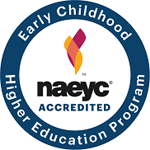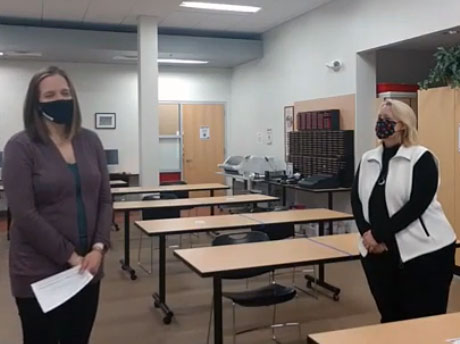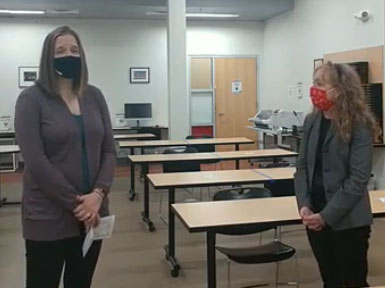Jump to:
Advanced Instructional Technology and Design Certificate
ASL Interpreter Program
Community and Family Service
Early Childhood Education Technology
Education Transfer Concentration
Foundations in Instructional Technology and Design Certificate
Social Work Transfer Pathway
Advanced Instructional Technology and Design Certificate
This program will address needs for a variety of individuals in the field of education and business. Individuals in education include: K-12 teachers, higher education instructors, and education students currently in our Early Childhood Education Technology and Education Transfer programs. In addition, individuals in a business setting that are required to develop training or educational materials would benefit from these certificates.
ASL Interpreter Program
The American Sign Language (ASL) Interpreter Preparation Program will prepare students to interpret between people who are hard of hearing or deaf and hearing individuals in such areas as education, work environments, video phone and performance interpreting! With a solid foundation in interpreting basics, students will be prepared for internships or entry-level ASL interpreting positions. Additionally, students will be well-prepared to continue their training in more complex interpreting such as medical and legal interpreting.
What to expect
- Extensive course work in both ASL and the ASL Interpreting Profession.
- Hands-on-opportunities through the language lab to practice their skills
- Real-world experience interpreting in the deaf community through a practicum
Career Opportunities
There are job opportunities for American Sign Language Interpreter in the following environments:
- Classroom interpreting (K-12 and beyond)
- Professional development
- Job Training
- Conferences
- Video phone interpreting
- Cruises
- Concerts
ASL Interpreting is an in-demand career with nationwide job mobility.
Community and Family Service
Make a difference in the lives of children and families living in our area. As a Community & Family Service graduate, you will work with expectant parents and parents of young children in their homes, helping families to understand their child’s development and support parental/child attachment. Parents are a child’s first and best teachers, and a graduate with this degree supports parental development by building on the family’s strengths.
Workers in this field will have specific and intentional roles in the following four activities/strategies areas:
- Promote and enhance the parent-child relationship
- Engage parents in discussions about their child’s growth and development and provide parents information and opportunities to learn about concrete things they can do to promote their child’s learning
- Encourage parents’ involvement in the education of their child
- Facilitate the delivery of services to children and families through collaboration with community partners
Job Opportunities For 2-Year Graduates
Graduates will find employment with Early Head Start and Head Start or similar community agencies as family advocates, home visitors, family service workers, or family educators.
Salary
Median income is currently slightly more than $30,000.
Job Outlook
According to the Bureau of Labor Statistics, jobs in this field will grow by 11 percent by 2024.
Early Childhood Education Technology Major
The Owens Community College Early Childhood Education Technology (ECET) program prepares competent and caring professionals dedicated to providing quality care and education for young children in our community. The ECET conceptual framework centers on the NAEYC Standards for Early Childhood Professional Preparation and emphasizes:
- Strong knowledge base — to inform student work and guide decision making
- Reflective practice — to challenge students to be child-centered and open-minded
- Practical application — to connect course work to real-life work with young children
- Equity focus — to cultivate culturally and linguistically responsive practices
Prior to entering or enrolling in any Early Childhood Education Program courses, students must have successfully completed all developmental courses into which they have tested. Developmental (Level 1) courses include: MTH 091, MTH 096, ENG 091, and ENG 096 or ENG 097. Students testing at the college level may move to the Preliminary (Level 2) courses. Upon completion of the developmental coursework the student may register for Preliminary (Level 2) coursework in the ECE program. Preliminary (Level 2) ECE majors must complete ECE 100 or EDU 100, EDU 101 and ENG 111 with a “C” or better. Successful completion of Preliminary (Level 2) coursework and completion of the red packet for admission will allow students to enroll in the Novice (Level 3) courses.
Career Opportunities
Graduates will be prepared for placement in child care centers, Head Start Centers, public schools, preschools, public preschool paraprofessional programs or other programs involved in the care and guidance of prekindergarten children and their families.
Accreditation

The Early Childhood Education Technology (ECET) Associate of Applied Science Degree at Owens Community College is accredited by the Commission on the Accreditation of Early Childhood Higher Education Programs of the National Association for the Education of Young Children. The current accreditation term runs from March 31, 2022 through March 31, 2024.
Education Transfer Concentration
This concentration provides the first two years of study for students who want to teach in a public school, prekindergarten through grade twelve. After receiving the Associate of Arts Degree, students should plan to transfer to a college or university offering a bachelor’s degree in education. Completion of the bachelor’s degree leads to Teacher Licensure in the State of Ohio. Students should not confuse this concentration with Owens’ Early Childhood Education program for students primarily intending to seek employment upon graduation with an Associate of Applied Science Degree, and who plan to work in a child care center, Head Start Center or as a Para-professional in a public pre-school.
Student Learning Outcomes
- Demonstrate effective communication in their area or concentration of study.
- Demonstrate their ability to access and interpret information within their area or concentration of study.
- Think critically to anticipate, recognize, and solve problems within their area or concentration of study.
- Add value through service to their community or area/concentration of study.
Transfer Options
Four-year colleges and universities may require different courses for a bachelor’s degree in education. Students should tailor their Owens program as closely as possible to the requirements at their four-year school of choice. Meet with an advisor for more information. It is strongly recommended that education students take the Praxis I exam prior to transferring to a university or college. Learn more about the Praxis I here: https://www.ets.org/praxis/oh
Social Work Transfer Pathway
The new Social Work Transfer Pathway is an evolution of the previous concentration and falls under the Ohio Guaranteed Transfer Pathway (OGTP). A student who completes all of the coursework will be eligible to earn an Associate of Arts degree.


The completion of the OGTP will be recorded on the student’s transcript and upon transfer to an Ohio public university, all coursework taken as part of the pathway will transfer to the university toward the completion of a bachelor’s degree in an equivalent field.
TRANSFER PARTNERS
Bowling Green State University
University of Findlay
Lourdes University
University of Toledo
ABOUT SOCIAL WORK
What makes social work unique from other professions is the focus on a person’s environmental factors that may affect the individual physically, mentally and emotionally as well as the person themselves. Social workers develop assessments and intervention opportunities to assist individuals in coping with their daily environment and to improve their lives through changes that can improve their future physically, mentally or emotionally. Guiding people to critical resources is a fundamental element of the social work profession, along with therapy, and being an advocate for change to improve social conditions and fight for social justice for all.
Gabriel Russell ‘21
JOB OPPORTUNITIES
Social workers can be found in healthcare and mental health facilities (hospitals, nursing homes, treatment centers); schools (helping to prevent kids from dropping out of school, working with children and families in need of help; working with developmental disabilities); justice/corrections (working with prisoners as they rejoin the community); aging; child welfare; and public welfare (community centers, nursing homes).
Some examples of positions in social work include:
Some of these require specialized training or an additional certificate.
- Social and Human Service Assistants
- Substance Abuse and Behavioral Disorder Counselors
- Social and Community Service Managers
- Health Care Social Workers
- Child, Family, and School Social Workers
- Probation Officers and Correctional Treatment Specialists
For more examples of social work professions, and the specialized training that may be required, visit www.NASW.org.
Mike Myers ’16
SALARY
Median annual earnings with a bachelor’s degree in 2019, based on U.S. Bureau of Labor Statistics data:
- $50,470
- $24.26 per hour
Job Outlook or Projected Growth, 2019-29
- 13% (much faster than average)


